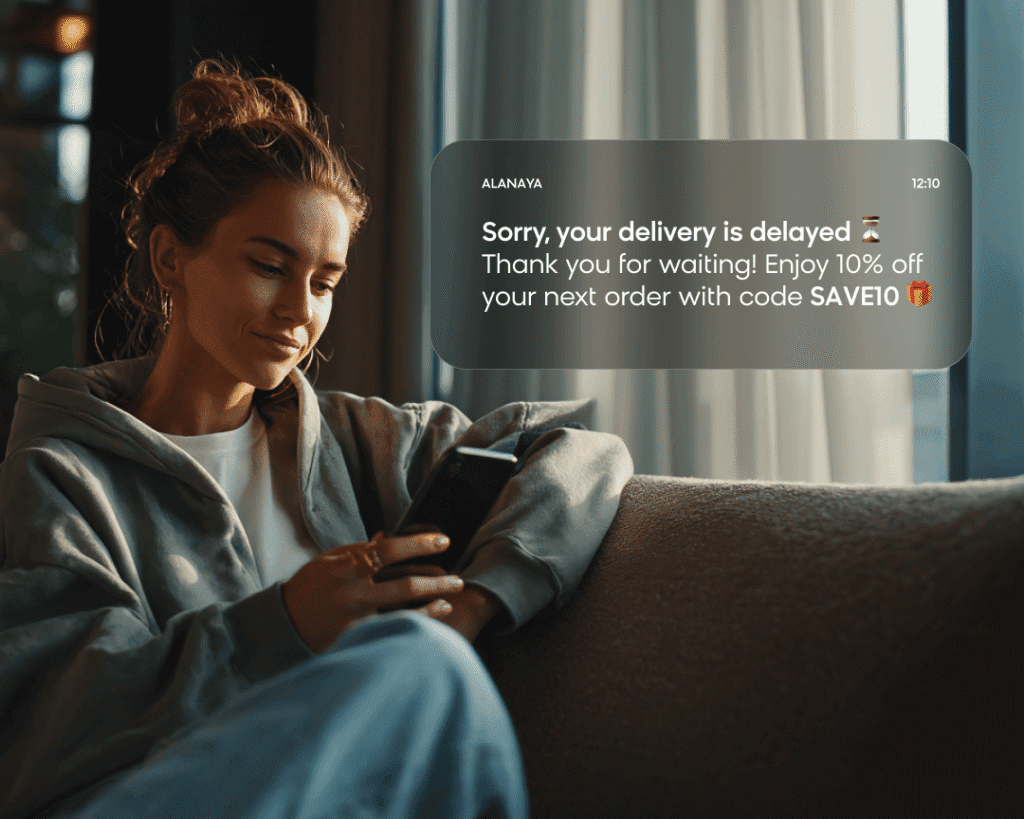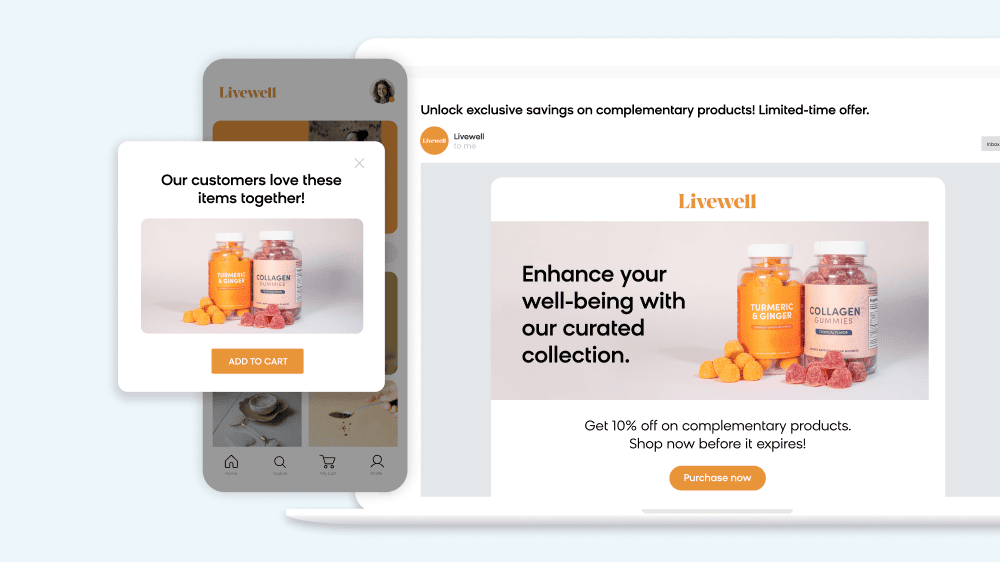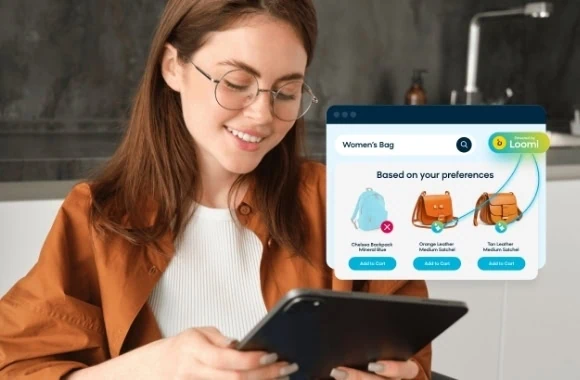Transactional SMS commands attention like no other communication channel. With a 98% open rate and 90% of messages read within 30 minutes, these automated alerts represent the most reliable way to reach your customers instantly. And yet, most brands squander this opportunity with generic, static messaging that feels robotic.
Modern transactional SMS transforms high-intent moments into revenue-generating touchpoints. Forward-thinking brands leverage AI personalization and unified customer data to deliver value at every interaction. This turns routine confirmations into branded experiences that build loyalty and drive conversions.
Let’s explore what transactional SMS is, how AI redefines its potential, and the specific strategies that transform your messages into measurable business outcomes.
What Is Transactional SMS?
Transactional SMS delivers essential, non-promotional information triggered by specific user actions or system events. These messages serve operational purposes: confirming your purchases, providing delivery updates, sending login codes, or alerting you about account changes.
Unlike marketing campaigns, transactional messages respond to immediate customer needs with time-sensitive information. Common triggers include order confirmations, shipping updates, appointment reminders, security alerts, and checkout abandonment notifications.
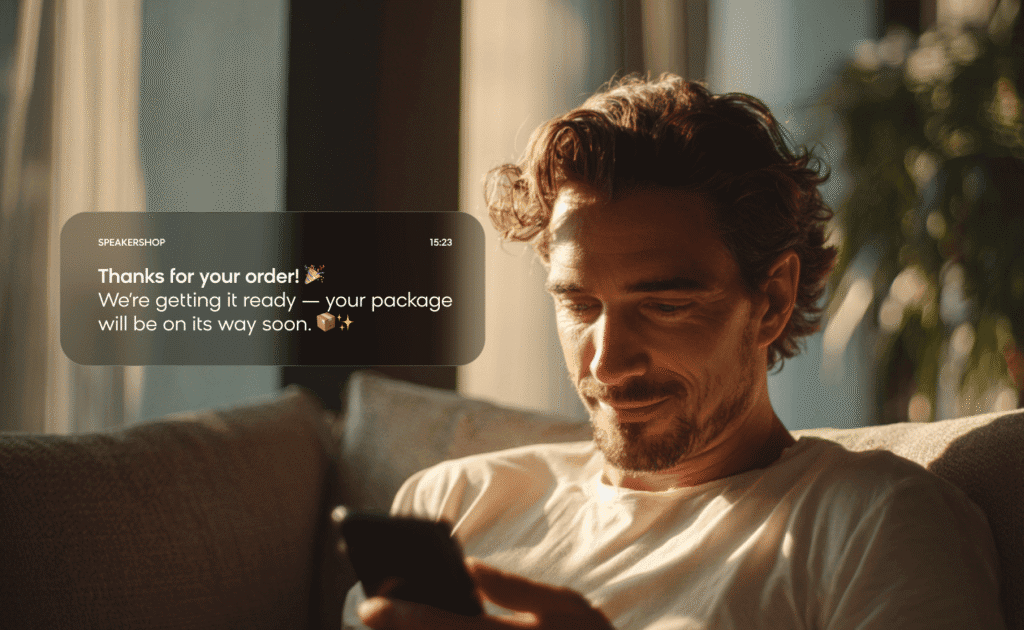
Think of transactional SMS as your digital sales associate at scale — it’s there when customers need information most, providing instant clarity and building trust through reliable communication. When properly configured through transactional SMS platforms, these messages become the backbone of your customer experience strategy.
The Strategic Difference: Transactional vs. Marketing SMS
Understanding the distinction between transactional and marketing SMS will shape your entire messaging strategy and set proper customer expectations:
| Attribute | Transactional SMS | Marketing SMS |
|---|---|---|
| Purpose | Informational, operational | Promotional, campaign-based |
| Trigger Type | System or user-initiated | Scheduled or segmented campaigns |
| Consent Requirements | Implied consent | Explicit opt-in required |
| Regulatory Status | Contextual under TCPA/GDPR | Higher regulatory oversight |
| Open Rates | ~98% | ~98% |
These differences matter for compliance, customer expectations, and message effectiveness. Transactional messages benefit from implied consent and higher engagement because your customers actively anticipate them. Research from the 2025 Consumer Texting Report shows 86% of consumers now opt in for business texts, representing a 20% increase since 2021, demonstrating growing acceptance of personalized, timely text messaging.
Beyond driving increased engagement numbers, SMS also has broader benefits for brands:
- Reduced support volume: Proactive order updates eliminate “where is my order?” inquiries, cutting your support costs while improving customer satisfaction
- Enhanced trust: Consistent, reliable communication builds confidence in your brand — customers know they can count on you for timely updates
- Journey continuity: Messages seamlessly connect transaction moments to ongoing relationship-building, creating a cohesive brand experience
It’s clear that SMS can lead to big results for brands, but you also need to be careful about how you implement the channel.
The Flaws of Static Messaging Systems
While SMS is a powerful channel, not all SMS is the same — legacy SMS platforms create predictable failure patterns that cost you revenue and customer loyalty. One-size-fits-all messaging treats your first-time buyers identically to VIP customers, missing crucial personalization opportunities that drive repeat purchases.
Static systems reveal critical gaps in your customer experience:
- Generic copy: Template messages fail to acknowledge individual customer context or purchase history, making your brand feel impersonal and disconnected
- Missing triggers: Systems don’t respond to delivery delays, return completions, or service issues — exactly when customers need support most
- Abandoned moments: Post-transaction touchpoints receive no strategic follow-up, leaving money on the table when customer interest peaks
For example, static systems may trigger only basic apology messages for delivery delays instead of personalized retention offers. Or, successful deliveries generate confirmation texts rather than product education content that increases customer lifetime value. These are missed opportunities to drive trust, loyalty, and repeat purchases.
This shift toward intelligent messaging isn’t just a trend — it’s becoming a competitive necessity. Research confirms this evolution: In 2024, 47% of brands increased AI adoption in SMS campaigns, recognizing that reactive messaging no longer meets customer expectations or business objectives. Forward-thinking brands are already implementing effective SMS marketing strategies that leverage AI for a competitive advantage.
How Bloomreach Transforms Messaging Into AI-Led Customer Journeys
Many legacy systems still rely on manual workflows and static messaging templates, creating the gaps discussed above. These outdated approaches can’t keep pace with modern customer expectations for personalized, intelligent communication.
With Bloomreach Engagement, you no longer need to view each transactional SMS as an isolated notification. Instead, you can treat each message as a strategic journey moment. Powered by Loomi AI, our platform combines unified customer data with real-time personalization to deliver contextually relevant experiences that drive measurable results.
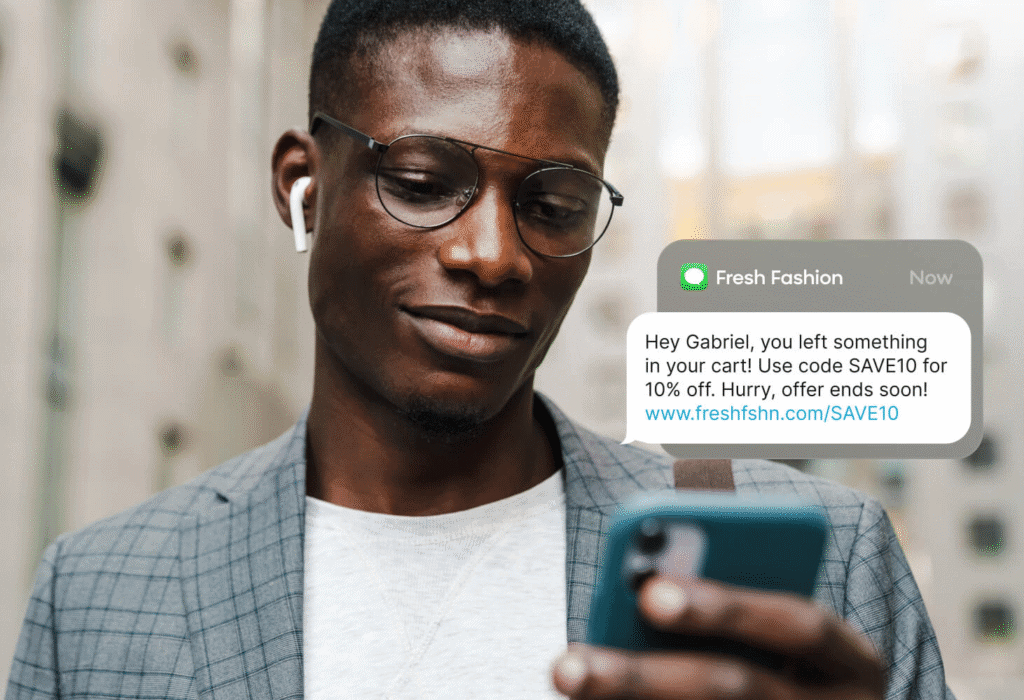
Core AI Capabilities That Drive Results
Our AI-driven platform has the features you need to create effective SMS campaigns:
- Unified customer data: Access to complete customer profiles enables personalization that incorporates purchase history, engagement patterns, and predictive insights, creating seamless experiences beyond SMS
- Real-time personalization: Our AI intelligently personalizes message timing, content selection, and fallback channel routing based on individual customer behavior patterns, with no need for IT involvement
- Compliance-first architecture: Built-in features like smart consent tracking, time zone intelligence, and phone number validation help you stay compliant while maximizing message deliverability
- Cross-channel strategy: Intelligent routing between SMS, email, push notifications, and more ensures message delivery through your customers’ preferred channels
Platform Advantage: AI-Native vs. Standard SMS Tools
| Feature | Bloomreach | Traditional SMS Tools |
|---|---|---|
| AI-driven content & timing | ✅ | ❌ |
| Unified customer data | ✅ | ❌ |
| Multichannel strategy | ✅ | ❌ |
| Dynamic localization | ✅ | 🟡 Limited |
| Automated compliance management | ✅ | ❌ |
Discover how our SMS marketing platform delivers these capabilities out of the box, eliminating the technical complexity that holds back traditional solutions.
Best Practices for Optimizing Transactional SMS
Successful transactional SMS implementation requires strategic attention to compliance, timing, and customer value creation. Moving beyond basic functionality, these practices ensure your messages deliver maximum business impact:
- Make consent collection seamless: Integrate opt-in requests naturally within your checkout flows while maintaining compliance standards (TCPA, GDPR, etc.). Make it feel valuable, not burdensome.
- Focus on human-centered communication: Write messages in a conversational, brand-appropriate tone with clear purpose statements and actionable next steps. Your customers should feel like they’re hearing from a helpful team member, not a robot.
- Ensure there’s instant delivery: Send messages immediately upon trigger events. Your customers expect instant confirmation — delays create anxiety and erode trust.
- Add strategic calls-to-action: Include relevant CTAs like “Track Package,” “Reorder Items,” or “Share Feedback” that extend engagement beyond information delivery.
- Provide proactive support: Anticipate customer questions with comprehensive information that reduces your inbound support volume while improving satisfaction.
- Keep optimizing: A/B test AI-optimized timing against static schedules — brands typically achieve significant engagement improvements through intelligent delivery.
- Incorporate interactive elements: Incorporate polls, reply options, or surveys that gather valuable customer feedback while boosting message engagement rates. Plus, with the rise of RCS, you can take your interactivity to the next level.
The results speak for themselves: Baby company Mayborn Group used a combination of email and SMS to drive a 126.9% greater conversion rate. Meanwhile, fashion brand boohooMAN was able to generate a 25x ROI from an SMS birthday flow.

Proven Industry Applications
Different industries leverage transactional SMS to address specific customer needs and business objectives. Understanding these industry-specific approaches will help you tailor your strategy for maximum relevance and impact:
- Retail and direct-to-consumer: Order confirmations, shipping notifications, delivery updates, abandoned cart recovery, stock availability alerts, and return processing updates create seamless shopping experiences
- Travel and hospitality: Booking confirmations, flight status changes, check-in reminders, gate assignments, and post-stay feedback requests reduce customer stress while building loyalty
- Financial services: Security alerts, payment confirmations, account balance notifications, transaction approvals, and fraud prevention messages establish trust through transparency
- Technology and electronics: Product setup instructions, warranty registrations, software update notifications, and technical support scheduling enhance customer success and reduce support burden
- Food and beverage: Order confirmations, preparation status, delivery tracking, loyalty point updates, and post-purchase satisfaction surveys create memorable experiences that drive repeat orders
Each industry benefits from tailored messaging strategies that address specific customer journey moments. Creating effective SMS marketing campaigns requires understanding these industry-specific needs and customer expectations.
Extending Single Notifications Into Comprehensive Lifecycle Engagement
Advanced transactional SMS strategies transform individual touchpoints into ongoing relationship-building opportunities. Rather than ending conversations with basic confirmations, intelligent systems identify moments to add value.
Think of each message as the beginning of a conversation, not the end of a transaction. Your customers are most engaged right after interacting with your brand — this is when strategic follow-up creates lasting impact:
- Order delay recovery: Convert shipping delays into loyalty-building moments by offering exclusive discounts, bonus points, or expedited future shipping. What feels like a problem becomes a trust-building opportunity.
- Delivery completion follow-up: Transform delivery confirmations into product education opportunities with setup guides, usage tips, or complementary product recommendations that increase customer lifetime value.
- Security event enhancement: Turn password reset notifications into security improvement suggestions, recommending biometric authentication or account security upgrades that protect your customers.
This approach creates continuous value loops where operational messages become relationship touchpoints that increase customer lifetime value. Bloomreach’s unified platform makes this level of sophistication achievable without complex technical implementation.
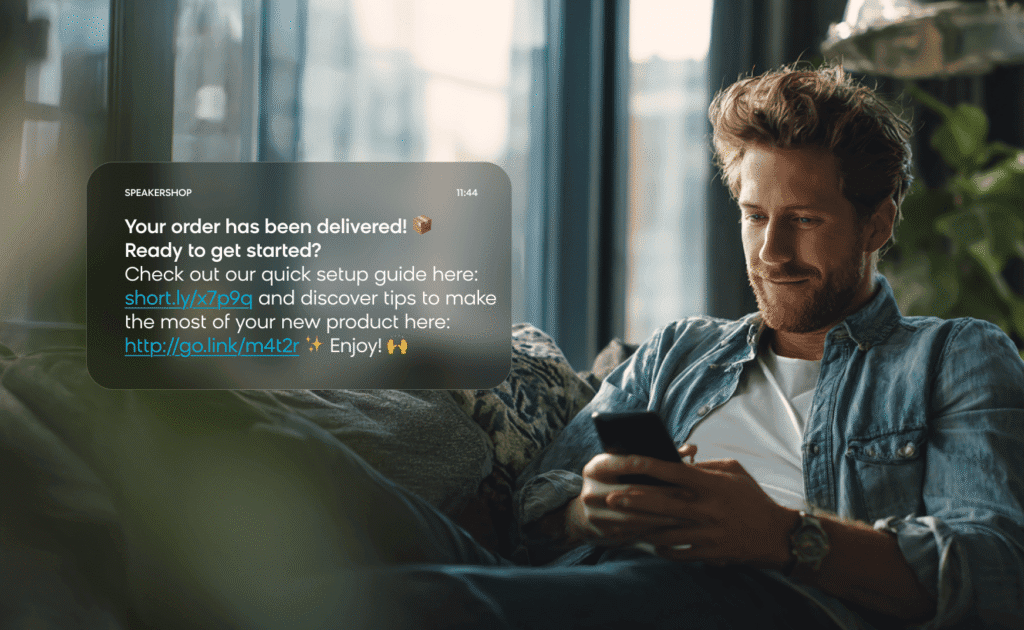
Transform Every Message Into a Revenue Opportunity
With shoppers craving personalized experiences, static messaging is a missed opportunity. Every transactional touchpoint offers potential to build relationships, drive additional revenue, and create lasting customer loyalty through personalized, intelligent communication.
Bloomreach’s AI-driven platform transforms transactional SMS from routine notifications into strategic business assets. By combining personalization with unified customer intelligence, your brand converts basic service messages into engagement opportunities that measurably impact customer lifetime value.
Ready to transform your transactional messages into revenue-generating opportunities? Schedule a demo to see AI-powered SMS in action and discover how leading brands achieve measurable results through intelligent messaging.
Frequently Asked Questions
What exactly is transactional SMS, and how does it differ from promotional messaging?
Transactional SMS delivers operational information triggered by customer actions like order confirmations or delivery updates. Unlike promotional campaigns, these messages serve immediate functional purposes and benefit from higher open rates and relaxed consent requirements.
Do I need explicit customer consent to send transactional SMS?
Transactional messages typically operate under implied consent when directly related to customer transactions or account activities. However, opt-in collection at checkout or account creation ensures compliance and improves deliverability.
Which regulations govern transactional SMS for ecommerce businesses?
TCPA (US) and GDPR (EU) provide primary regulatory frameworks, but there are state-specific regulations (like Texas SB 140) that may also impact your processes. Transactional messages receive more lenient treatment than promotional content, but proper consent documentation and opt-out mechanisms remain essential.
How can I personalize SMS beyond including customer names?
Advanced personalization incorporates purchase history, delivery preferences, geographic location, past engagement patterns, and predictive recommendations. AI systems analyze behavior data to optimize message timing, content, and channel selection.
How does AI improve customer engagement in transactional messages?
AI optimizes send timing based on individual customer activity patterns, personalizes content using behavioral data, automatically routes messages through preferred channels, and identifies opportunities for journey extension that increase lifetime value.

